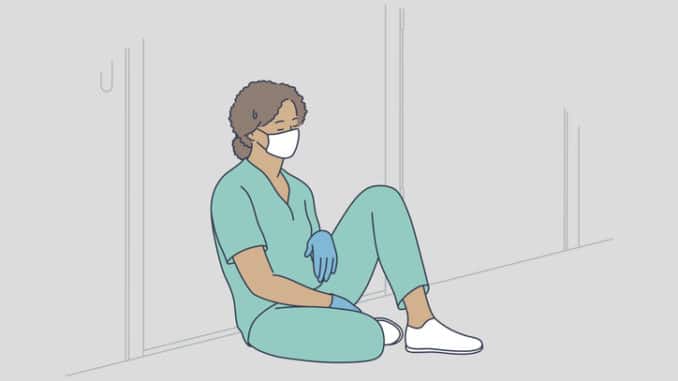
Government and employers must assess risk and ensure sufficient personnel, resources, and support to protect staff until an informal inquiry has been heard – Jo Best reports
This is an edited version of an article that originally appeared on The BMJ
Stories of stress and mental health problems because of work are nothing new for NHS staff, but the pandemic has led to increased recognition of ‘burnout’—the emotional, physical, and mental exhaustion caused by excessive and prolonged stress—and ‘moral injury’—when professionals are forced to act against their conscience.
The People’s Inquiry
Despite broad and longstanding support for starting a formal review quickly, in May prime minister Boris Johnson said that a public inquiry would begin in spring 2022 – but delay could mean that opportunities to learn vital lessons are missed, leading to more deaths and harm to the public and key workers, critics say.
For this reason, the campaigning group Keep Our NHS Public convened the ‘People’s COVID Inquiry’, chaired by the human rights lawyer Michael Mansfield QC. Over nine sessions it gathered evidence from some 40 expert witnesses, key workers, patients and bereaved people and recently published interim recommendations.
Testimony described rises in reported burnout and reduced feelings of wellbeing and resilience. The panel heard repeatedly how staff felt undermined and undervalued when, having put their lives at risk to work through the pandemic, the government offered them a one per cent pay rise. Moral injury wasn’t intended to be considered by the inquiry but witnesses mentioned it repeatedly.
The inquiry panel had “all been shaken by how bad it is,” said Mansfield. “It’s moral injury caused by the fact that they’ve been put into a situation not of their choosing.”
Losing the drive to keep working
A BMA survey with 6,126 respondents in April 2020 found that more than 40% of doctors were experiencing depression, anxiety, stress or burnout that had been worsened by the pandemic; 60% reported more fatigue or exhaustion than normal.
“For people to leave home every day to do hard and dangerous work, they need to know that it’s worth it, that it means something,” Rachel Sumner, senior lecturer in psychology at the University of Gloucestershire, told the inquiry. “We have witnessed that meaning in life is going down,” she said, with healthcare workers feeling hopeless and losing the drive to keep working.
Sumner is researching wellbeing, resilience and burnout among key workers in the UK and Ireland. Levels of exhaustion, cynicism and feelings of inadequacy reported by frontline staff had all risen significantly six months into the pandemic, she told The BMJ, and by 12 months levels remained high.
“This was all being driven by the perceived timeliness of the government’s actions,” she told the inquiry. Metrics in Ireland, where the government’s response was seen as more timely, were better than in the UK, she said. UK workers tended to find government messaging unclear, thought that schools, universities, and pubs were open when they shouldn’t have been and believed rule breaking wasn’t dealt with consistently.
Stephen Reicher, professor of social psychology at the University of St Andrews, and member of the Independent Scientific Pandemic Insights Group on Behaviours, which advises the independent government advisers the Scientific Advisory Group for Emergencies on behavioural science, told the inquiry that burnout is not simply from overwork; feeling unable to do your job properly, however hard you work, also contributes.
Healthcare workers feel undermined, including by the policies that led to COVID patient numbers spiking, he said. Other witnesses criticised the government’s subsidised ‘Eat Out to Help Out’ scheme to encourage people back into restaurants last summer. Reicher also mentioned having to choose between allocating beds to patients with COVID or other urgent needs, such as cancer care, and the government’s 1% pay offer. All of this is “deeply demoralising, and leads to profound burnout,” he said.
Repair the context
All this is likely to affect staff retention. The inquiry heard that departures will magnify pressure on the NHS workforce, making it harder to provide the care that patients expect and healthcare workers value, exacerbating future risks of moral injury and burnout.
The inquiry is expected to publish its final report and recommendations in the autumn.

Be the first to comment